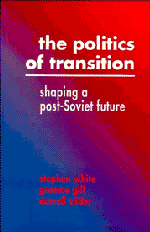Book contents
- Frontmatter
- Contents
- Preface
- 1 Beyond Marxism
- 2 Reforming the electoral system
- 3 Structures of government
- 4 The Presidency and central government
- 5 From union to independence
- 6 Patterns of republic and local politics
- 7 The withering away of the party
- 8 The emergence of competitive politics
- 9 The politics of economic interests
- 10 Public opinion and the political process
- 11 Letters and political communication
- 12 The Soviet transition and ‘democracy from above’
- Notes
- Index
9 - The politics of economic interests
Published online by Cambridge University Press: 27 August 2009
- Frontmatter
- Contents
- Preface
- 1 Beyond Marxism
- 2 Reforming the electoral system
- 3 Structures of government
- 4 The Presidency and central government
- 5 From union to independence
- 6 Patterns of republic and local politics
- 7 The withering away of the party
- 8 The emergence of competitive politics
- 9 The politics of economic interests
- 10 Public opinion and the political process
- 11 Letters and political communication
- 12 The Soviet transition and ‘democracy from above’
- Notes
- Index
Summary
An important characteristic of the transition from Soviet to post-Soviet politics has been the rise of new types of interest groups that have sought to influence the political process – in particular, policies connected with economic reform. This, together with the slow rise of political parties, represents an important stage in the democratic development of the republics that formerly made up the Soviet Union. Newly created business associations as well as new and reconfigurated trade unions are the most important of these groups. The new structures can be viewed in contradictory ways. On the one hand, interest groups are an integral part of civil society, and economic interests should have the same rights to organise as any other group in society. Through these groups, economic forces that are vital to the development of a market economy and a democratic polity are represented in the policymaking process. On the other hand, economic interest groups pose a danger to new democratic institutions because of the potential influence of money, the ability to organise strikes, and the use of other methods to insure favourable treatment.
In the Soviet period, certain branches of the economy had powerful spokesmen in top decision-making bodies in both the Communist Party and the government. The interests of heavy industry and, in particular, military industry had long been dominant at all levels of policy making.
- Type
- Chapter
- Information
- The Politics of TransitionShaping a Post-Soviet Future, pp. 164 - 177Publisher: Cambridge University PressPrint publication year: 1993



